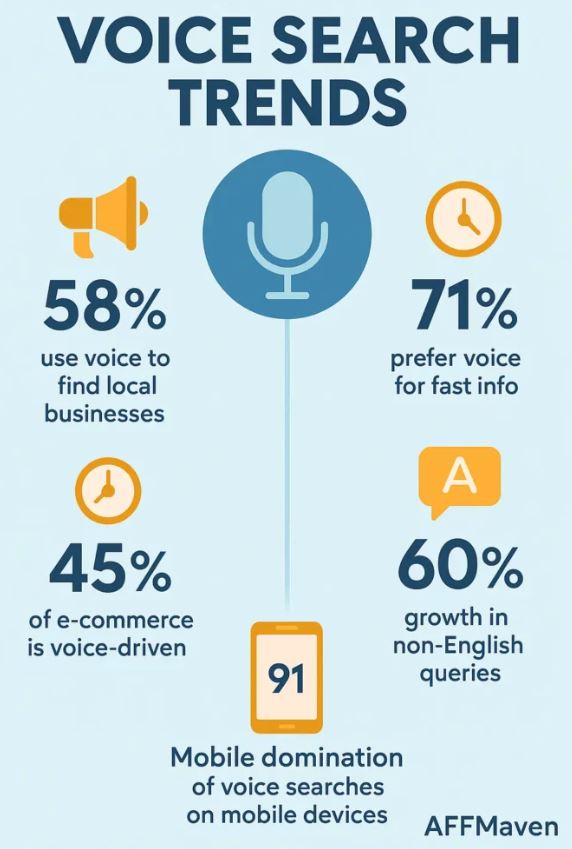
In today’s fast-paced digital world, more people are turning to voice assistants like Siri, Alexa, and Google Assistant to find answers instantly. From searching for nearby restaurants to asking complex questions, voice search is rapidly transforming how users interact with search engines. This shift means traditional SEO alone is no longer enough — businesses must now adapt their strategies to stay visible in voice search results. In this guide, we’ll explore the essentials of Voice Search SEO Optimization, why it matters, and practical tips you can use to improve your rankings and capture more organic traffic.
Focus on Conversational Keywords
People use voice search differently than typing. Instead of short keywords like “best pizza NYC”, they ask full questions like “Where can I find the best pizza near me?”.
Use long-tail, natural, and question-based keywords in your content.
Optimize for Featured Snippets (“Position Zero”)
Most voice assistants read answers directly from Google’s featured snippets.
Use short, clear, and direct answers (40–50 words) in your content to increase chances of ranking in voice search.
Improve Local SEO
Nearly 58% of voice searches are local (e.g., “nearest coffee shop open now”).
Optimize your Google Business Profile, add NAP (Name, Address, Phone) consistently, and include “near me” phrases in your content.
Use FAQ Sections
FAQs are a goldmine for voice search optimization.
Add an FAQ section with questions phrased the way users ask verbally (e.g., “How do I optimize my website for voice search?”).
Optimize for Mobile and Page Speed
Voice searches often happen on mobile. A slow website = lost rankings.
Use responsive design, compress images, and ensure your site loads in under 3 seconds.
Target Natural Language and Intent
Voice assistants interpret user intent more than exact words.
Write content that answers who, what, when, where, why, and how questions clearly.
Use Structured Data (Schema Markup)
Schema helps search engines understand your content better.
Add FAQ schema, LocalBusiness schema, and How-To schema to boost chances of being chosen for voice answers.
Create Content for “Micro-Moments”
Voice searches are usually quick and urgent: “Best plumber near me”, “Weather tomorrow”.
Optimize content to give instant, actionable answers.
Keep Content Clear and Simple
Voice assistants prefer content that’s easy to read aloud.
Use short sentences, active voice, and simple vocabulary for higher voice SEO success.
Track and Adjust
Use tools like Google Search Console, SEMrush, and Ahrefs to track voice-search-friendly keywords and adjust content regularly.

The Importance of Voice Search Optimization for SEO
Voice seek is converting how humans search for statistics online. Millions now use Google Assistant, Siri, and Alexa to ask questions instead of typing. Voice searches are longer and sound like normal speech. To rank well, businesses must adapt their SEO. Optimizing for voice search improves visibility, boosts rankings, and attracts more organic traffic. It also builds trust with users who want quick answers. If you skip voice search SEO, your competitors may get ahead. Investing in this now ensures your website stays future-ready and meets the growing demand for hands-free search.
How to Find Voice Search Keywords
Voice searches are conversational. People use full questions like “What is the best pizza near me? ” instead of short phrases like “best pizza. ” To optimize, you must research natural language keywords. Tools like AnswerThePublic, SEMrush, or Google Keyword Planner can help. Focus on “who,” “what,” “where,” “when,” and “how” questions. Also include long-tail keywords that match real conversations. Local phrases, like “near me,” are especially powerful for small businesses. By finding and using these keywords, you increase your chances of showing up when people talk to voice assistants.
How to Make Content Voice Search-Friendly
To rank for voice search, your content must be simple, direct, and conversational. Write in a way that answers questions quickly. Use brief paragraphs, bullet points, and headings. Create FAQ pages since most voice queries sound like questions. Add featured snippets by giving clear definitions and step-by-step answers. Use schema markup to assist Google recognize your content material better. Keep your tone natural, as if you are talking to a person. Optimizing this way improves your ranking for both voice and text searches.
Voice Search Tips for Local SEO
Voice search is highly important for local SEO. Most users ask for local services, such as “plumber near me” or “best dentist in Lahore. ” To capture this traffic, make sure your Google Business Profile is complete. Add your enterprise name, address, telephone number, and operating hours. Use nearby key phrases for your internet site content material and weblog posts. Encourage customers to leave reviews, as voice assistants often suggest businesses with high ratings. Optimizing for local voice search helps you attract customers who are ready to visit or call right away.
The Impact of Voice Search on Search Engine Rankings
Voice search affects how Google and other engines rank websites. Search engines now look for content that is clear, mobile-friendly, and fast-loading. Websites that answer questions directly often appear in featured snippets, which voice assistants read out loud. This gives your business more visibility and authority. A strong mobile optimization ensures your site performs well in both text and voice results. Ignoring voice search may push your site down the rankings, while optimizing gives you a competitive edge.
The Major Players: Google vs. Siri vs. Alexa
Different voice assistants use different data sources. Google Assistant relies on Google’s algorithms. Siri uses Apple Spotlight and Bing. Alexa also uses Bing and third-party sources. To rank across all platforms, businesses must adapt content for each. This means optimizing for Google SEO, Bing SEO, and structured data. By doing this, your website appears on multiple devices, including smartphones, smart speakers, and cars. Covering all platforms increases visibility and allows you to reach a wider audience.
Role of Mobile Optimization in Voice Search SEO
Most voice searches appear on cellular devices. If your website is slow, hard to read, or not mobile-friendly, you will lose traffic. A responsive design, fast loading speed, and easy navigation are must-haves. Google also ranks mobile-friendly websites higher, which directly impacts voice search rankings. Adding click-to-call buttons, maps, and local details improves the mobile experience. Strong mobile optimization ensures your site performs well in both traditional and voice searches, giving you a big advantage over competitors.
Structured data and Featured Snippets for Voice SEO
Structured data (schema markup) helps search engines understand your website better. It highlights key details like business hours, services, and reviews. This makes your content easier for Google, Siri, and Alexa to read out. Featured snippets are also important for voice search. These are the fast solutions Google suggests on the pinnacle of seeking results. Voice assistants often read these directly. By using schema and creating clear, short answers, you increase your chances of being chosen as the top result.
To get command of complete Seo guide and tips, read our blog : A Step BY Step Guide To Optimize Your Entire Website in 2025.
AI Technologies in Voice Search Optimization
AI and machine learning power all voice assistants. They improve every year, giving more accurate and personalized results. Businesses should use AI-driven SEO tools to analyze user intent and trends. Chatbots, predictive search, and natural language processing tools also help. AI makes it easier to understand what people want and how they ask for it. Optimizing with these tools ensures your content matches real conversations. This leads to higher rankings and better user experiences across devices.
Future Trends of Voice Search Optimization
Voice search is only going to grow. Smart speakers, wearables, and in-car voice systems are becoming more common. Businesses that invest in voice SEO now will stay ahead of competitors. Future trends include hyper-local searches, voice shopping, and AI-powered personalization. Content must remain conversational, mobile-optimized, and data-driven. Companies that ignore these changes risk losing visibility. The future belongs to brands that embrace voice search early, creating fast, clear, and helpful content for users.

Voice Search SEO Optimization Service:
If you’re looking to stay ahead in this fast-evolving digital landscape, our team at Dev Seo Hub provides expert Voice Search SEO Optimization services. From conversational keyword research to local SEO and structured data implementation, we help businesses rank higher on Siri, Alexa, and Google Assistant. Partner with us to make your website future-ready and capture more traffic through voice search.
Frequently Asked Questions
Q1: What is voice search optimization in digital marketing?
Voice search optimization in digital marketing means improving your website so it appears when people use assistants like Google Assistant, Siri, or Alexa. It includes conversational keywords, structured data, and local SEO to capture more organic traffic.
Q2: What AI technologies work best for voice search optimization?
AI tools like natural language processing, machine learning, and predictive analytics work best. They help understand how people speak and what they ask. Platforms like SEMrush, Ahrefs, and AI-driven SEO tools improve keyword research and content targeting.
Q3: How do I create FAQs to improve voice search optimization?
Create FAQs using natural, conversational questions. Think approximately how humans speak, now no longer how they type. Use “who,” “what,” “when,” “where,” and “how” questions. Write short, clean answers. Adding structured data makes it easier for voice assistants to pick up your FAQs.
Q4: What are the latest voice search optimization trends for voice assistants?
Trends include hyper-local searches, voice shopping, and AI-driven personalization. People need quick, direct answers. Optimizing for snippets, mobile speed, and local SEO ensures you stay ahead. Businesses that follow these trends gain higher visibility and better conversions.
Q5: Why is mobile optimization important for voice search SEO?
Most voice searches occur on cellular devices. A fast, responsive, and mobile-friendly website improves rankings and user experience. Without mobile optimization, your chances of appearing in voice search results are low.


